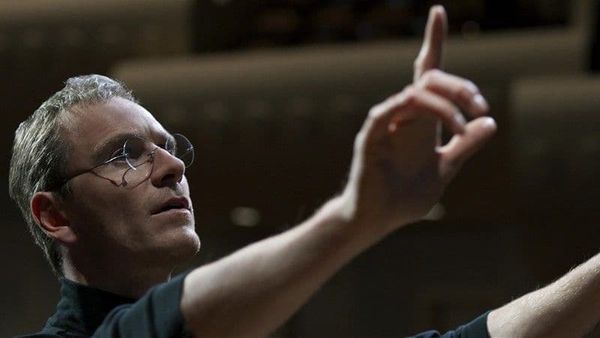Eye For Film >> Movies >> Steve Jobs (2015) Film Review
Steve Jobs
Reviewed by: Anne-Katrin Titze

Difficult company politics and even more complicated family dynamics are exposed as Michael Fassbender's Jobs suggests the machinations of his mind, mainly through interactions and in lightening quick flashbacks. Danny Boyle's Steve Jobs, screenplay by Aaron Sorkin, despite the formal construction of having most of the talking take place before the three major launches, is all about the private man with his demons on display. Several people discuss with Jobs what it means to be an adopted child. "It's control," he exclaims, this explains his psyche.
The biopic of the central player of the digital revolution, played by the non-look-alike Fassbender as a man who likes his calla lilies in place and his feet clean at any price, takes flight through a number of preludes. From the 1984 launch of the first Macintosh, to the NeXT workstation in 1988 and the iMac in 1998, we get to know the key players by their behavior behind the scenes, right before the big events.
Fassbender does his best to not make the man easily likable at first. And that appears to be Boyle's point. By slowly exposing the faults of the people around him, the "genius" suddenly doesn't seem so bad. Jobs strides along as many backstage corridors as did last year's Oscar-winning Birdman: Or (The Unexpected Virtue of Ignorance).
"The allies winning the war and this," with "this" referring to the Macintosh launch, are the two most important moments of the 20th century for Jobs and he is not joking. Very craftily, scenes slide from familiar to unfamiliar and back. The "perfect cube" will invade homes all over the world. A nightly board meeting, with lovely cinematic rain splattering against the window, decides the fate of who stays and who leaves the company.
Kate Winslet, as Head of Marketing Joanna Hoffman, gets to wear three wildly unflattering outfits with matching hairstyles that vaguely fit the decade, a conscious choice, I am sure, by costume designer and longtime Boyle collaborator Suttirat Anne Larlarb, who also did the costumes for Robert Zemeckis's The Walk. Joanna Hoffman is the only person to persistently stand up to Jobs and Winslet revels in her transformations.
Seth Rogen as Apple co-founder Steve Wozniak, Jeff Daniels as Apple CEO and former Pepsi executive John Sculley, Katherine Waterston as ex-girlfriend Chrisann Brennan, Michael Stuhlbarg as Andy Hertzfeld, computer scientist on the original Apple development team, and Lisa, Jobs' [non-] daughter in three ages (Makenzie Moss at 5, Ripley Sobo at 9, and Perla Haney-Jardine at 19), act and react with the man who says sentences such as: "God sent his son on a suicide mission but we like him anyway because he made trees."
Waterston plays Chrisann as a cipher. She does that mainly through her voice which has many shades, neutral and desperate, resigned and annoying when we don't want her to be annoying but a shining protector of her child. Steve Jobs has no problem talking about his aiding "underprivileged kids", while ignoring the one right in front of him.
The triumphant Jobs return, garbed in the famous black turtleneck and belt-free jeans - iconic images like this are sprinkled throughout and legends are partially explained. A huge photograph of computer science pioneer Alan Turing covers a wall. Turing, a great admirer of Walt Disney's Snow White, killed himself by poisoning an apple.
Jobs, in Boyle's movie, keeps his answer about the logo and possible connections as inconclusive as he does when his small daughter asks him if the personal computer Lisa was named after her or if she was named after the "Local Integrated Software Architecture." He calls it "coincidence." Others would say "print the legend."
Alex Gibney's superb documentary, Steve Jobs: The Man In The Machine, is the perfect companion film for Danny Boyle's Steve Jobs.
Reviewed on: 05 Oct 2015



















